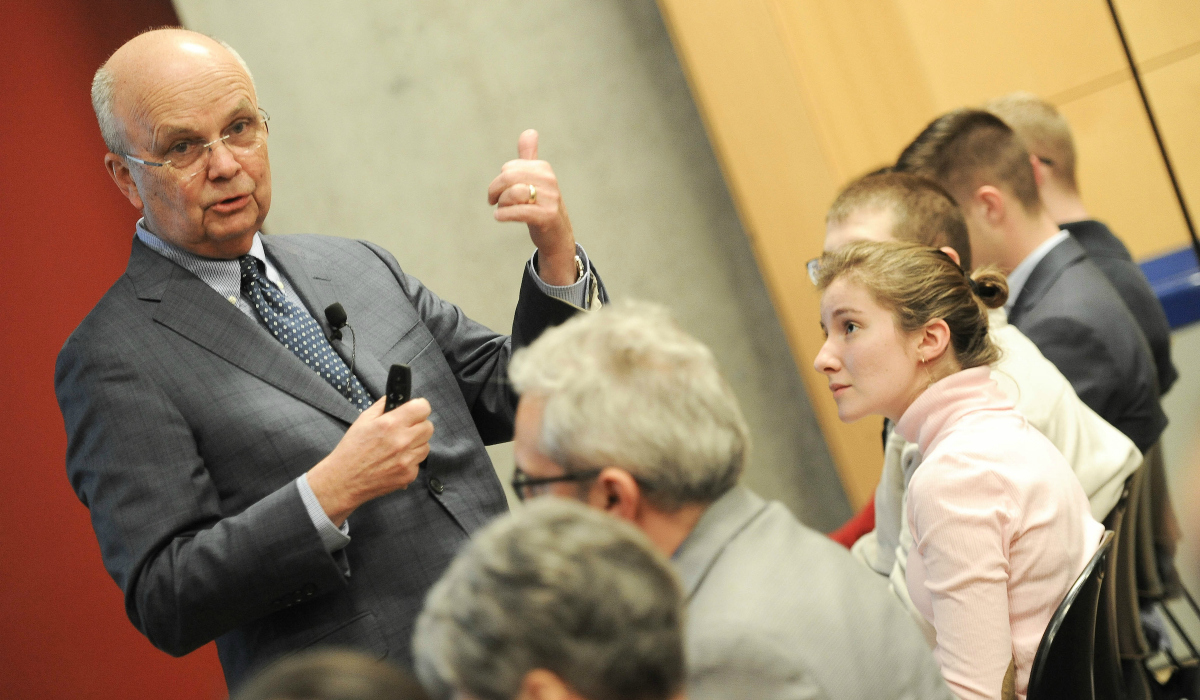

Retired U.S. Air Force general and former CIA director Michael Hayden challenged perceptions about the stability of the world in a talk last week at The Catholic University of America.
Nicholas Dujmovic, director of Catholic University’s new Intelligence Studies Program who served as a CIA intelligence officer for 26 years, had invited Hayden and introduced him on Nov. 22 to an overflow crowd of students and faculty. He described Hayden as “the senior statesman of U.S. intelligence.”
University students, some of them learning about U.S. intelligence for the first time this semester, said that they appreciated Hayden’s commitment to the nation, which also includes his service as National Security Agency (NSA) director from 1999 to 2005.
Cullen Murphy, a sophomore politics major from North Attleboro, Mass., who is taking Dujmovic’s course, Contemporary U.S. Intelligence, said, “Our school community was very fortunate to hear from Director Hayden, with his years of service and experience in the Intelligence Community, and to share in this unique opportunity.”
Hayden opened his remarks by saying that, although he’s seen the world less safe than it is today, he’s never seen it more complex. He noted several “techtonic shifts” in global politics that are behind both the complexity and instability the world is experiencing today and the chaos that may lie ahead.
In the past, great powers like the United States got things done and wielded influence through the movement of men and metal — i.e. military power. Today’s interconnected world, however, gives power and influence disproportionately to small states and non-state actors through terrorism and cyber attacks. The former NSA director noted that “cyber is the largest ungoverned universe ever.”
The relative stability of the world, in the past, was characterized by maps that didn’t change much or often. Today, Hayden warned, the world has to expect that maps will be changing all the time.
On a map of Europe, Hayden said that Yugoslavia, the USSR, Czechoslovakia, and Crimea are examples of profound changes. Of the Middle East, Hayden said, “Iraq does not exist. Syria does not exist.” These countries were created for the convenience of European powers, and present-day realities are sweeping them away, he added.
Michael Carr, a senior politics major from Bethesda, Md., who is taking Introduction to American Intelligence, remarked after the talk that “Hayden’s parallel between the ongoing struggle within the Islamic world and the Christian Reformation of the 16th century gave me new insight on the current state of foreign affairs.”
Another major “techtonic shift” cited by Hayden is the rise of China. He stressed that there is “no good reason” for China to be an enemy of the United States — a competitor, to be sure, but not an enemy.
China’s relationship with the United States will depend on internal Chinese conditions that may threaten the legitimacy of the Communist Party, encouraging it to play “the nationalism card,” which runs the risk of creating a conflict with the U.S. over, for example, navigation rights in the South China Sea, Hayden added.
Reflecting on the implications of the recent presidential election for U.S. foreign policy, Hayden outlined some likely emphases:
Hezekias Kassa, a junior politics major from Washington, D.C., said, “General Hayden's talk was a welcome insight into the world from someone with a background of real-world experience gathered at the helm of American intelligence. Insight from someone who was actually making history is always an experience to be sought."
For more information about the University’s new program in Intelligence Studies, contact the program director at dujmovic@cua.edu.